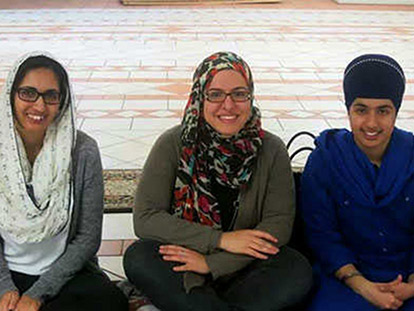Feb
Feb
It's often believed that Muslim women, especially those who wear the hijab, are liberated from the media-driven standards of beauty. But growing evidence indicates that Muslim women and teens are just as susceptible to negative body image and eating disorders.
Across Canada, as well as elsewhere around the world, the month of February kicked off with the annual Eating Disorders Awareness Week (EDAW). A joint effort headed by a variety of organizations and community groups, EDAW aims to raise awareness about eating disorders and the factors causing them.
For Registered Dietician Nida Mir, EDAW is an important campaign and ties in well with other critical health awareness campaigns, such as Nutrition Month and Mental Health Awareness Week.
“Eating disorders are a part of mental health awareness and nutrition counseling, so it all flows together nicely regarding some key elements of our health,” Ms. Mir explains.
“I think EDAW is really important because eating disorders often are pushed under the rug. When someone is suffering from eating disorders, it's not always blatantly obvious to the world and often they are surrounded in isolation. Families also bear a stigma and blame themselves when their children suffer from eating disorders. So we have to take this stigma away, we have to break out and talk about these problems more, to help with prevention, to become more aware, to give support and help with fundraising.”
According to the National Eating Disorder Information Centre, when someone is suffering from an eating disorder, they have negative and self-critical thoughts and feelings about their body weight and food. Their eating habits disrupt their daily activities and their normal body functions; preventing them from enjoying life fully.
“Eating disorders can be caused by factors that are biological, psychological, development or societal, but the psychological and societal ones are often more common,” says Mir. “There is a lot of pressure on people today, especially on young people, and they are often overly criticized for their weight and eating habits. Peer pressure, teasing and media influences can also play a role.”
The common clinical eating disorders are anorexia nervosa, bulimia nervosa, binge-eating and non-specified eating disorders, which can be a combination of the three.
Although eating disorders can affect both men and women, women are more likely to be affected by and hospitalized for anorexia and bulimia. The Public Health Agency of Canada estimates that three per cent of women will be affected by an eating disorder in their lifetime and that in the past 25 years, hospitalization rates have increased by 34 per cent for girls under the age of 15 suffering from eating disorders, and by 29 per cent for the 15-24 age group.
“There is a tremendous amount of pressure to be thin,” Mir says. “The women we see portrayed in the media are always thin and beautiful. Women feel they are being judged based on their appearances, in society, in school, in the workplace and we even see this judging of women against women. This pressure drives many women to adopt dangerous eating habits, negative beliefs about food and unhealthy body image of themselves. Others may deal with the extreme pressures they face by using food as a coping mechanism and overeating. It becomes quite a challenge for a young woman, trying to identify herself in a very male-centered, sexualized world and it's very sad and disturbing to see women suffering like this.
“Instead of trying to change our appearances to fit into these ideals of society, we need to change our values. We must promote healthy body weight and to build the confidence of girls growing up and ensure they have the proper education and support system to deal with these pressures and the correct decisions about their bodies,” she adds.
While eating disorders remain a greater cause of concern in women, Mir emphasizes that adequate attention must also be given to young men.
“We see an increased emphasis on fashion and now trends like skinny jeans are being adopted by young men too, and this increases the pressure on them to fit a certain physical ideal,” Mir explains. “There is also a lot of pressure to be lean and muscular and many young men push themselves to extremes in body building and weight lifting, and even indulge in dangerous use of steroids, to try to match these ideals.”
According to Mir, acknowledging the problem and seeking help are among the first steps towards making positive change. She also points out that people often make common mistakes when trying to adopt healthier eating habits, which only serve to frustrate or demotivate them.
“You can't take huge leaps towards health and nutrition, you have to start with small strides and make small, but consistent changes,” she says. “Don't expect change to come instantaneously, you must keep working at it. Start by focusing on one or two changes, instead of trying to follow a drastic new blueprint at once. Better nutrition only works when it's constantly maintained and when there's renewal. You must know yourself, know your limitations and don't be too hard on yourself if you slip up from time to time. Most importantly, don't see these lifestyle changes as something negative. See it as a journey to enjoy and take your time so you do enjoy it and are able to make changes that will soon become second nature to you.”
On her blog, Mir shares nutrition advice with parents, who want to help their children to eat better. She says it's critical for healthy eating habits and positive body image to start from a young age.
“The first thing parents need to do is be the best example for their children,” she says. “You are the parent, you know your children best, so you must be the nutrition guru and diva for their developing palates. Don't scold them and make them feel bad about themselves, rather always be there to support them on their journey to better health. Teach them to listen to their body's hunger and understand how their body works. Make sure to always keep fresh fruits and vegetables accessible in the home for them, but they must also see you eating and enjoying these foods. Allow them to also enjoy the treats they like, but always in moderation and as part of a healthy diet. It's also important to teach them about where food comes from, to allow them to appreciate the journey of food. Expose them to different types of food and also involve them in the selection and preparation of meals. Engage in daily physical activity together as a family, as this is an essential part of health and nutrition and it is often overlooked. And throughout it all, just try to create positive eating experiences for them, so they have positive associations with food. Dinner time should be a happy time they look forward to ”“not a time of scolding and stress over what they did or didn't eat!”
The skinny on eating disorders:
Individuals with anorexia nervosa refuse to maintain a minimally normal body weight, carry an intense fear of gaining weight and have a distorted perception of the shape or size of their bodies.
Individuals with bulimia nervosa undertake binge eating and then use compensatory methods to prevent weight gain, such as induced vomiting, excessive exercise or laxative abuse. They also place excessive importance on body shape and weight.
A diagnosis of binge eating disorder (BED) is made if the binge eating is not followed by some compensatory behaviour, such as vomiting, excessive exercise or laxative abuse. This disorder is often associated with obesity.
Source: Public Health Agency of Canada
For more information about eating disorders and nurturing healthy eating habits and positive body image, visit the National Eating Disorder Information Centre online at http://www.nedic.ca/
This article was produced exclusively for Muslim Link and should not be copied without prior permission from the site. For permission, please write to info@muslimlink.ca.












